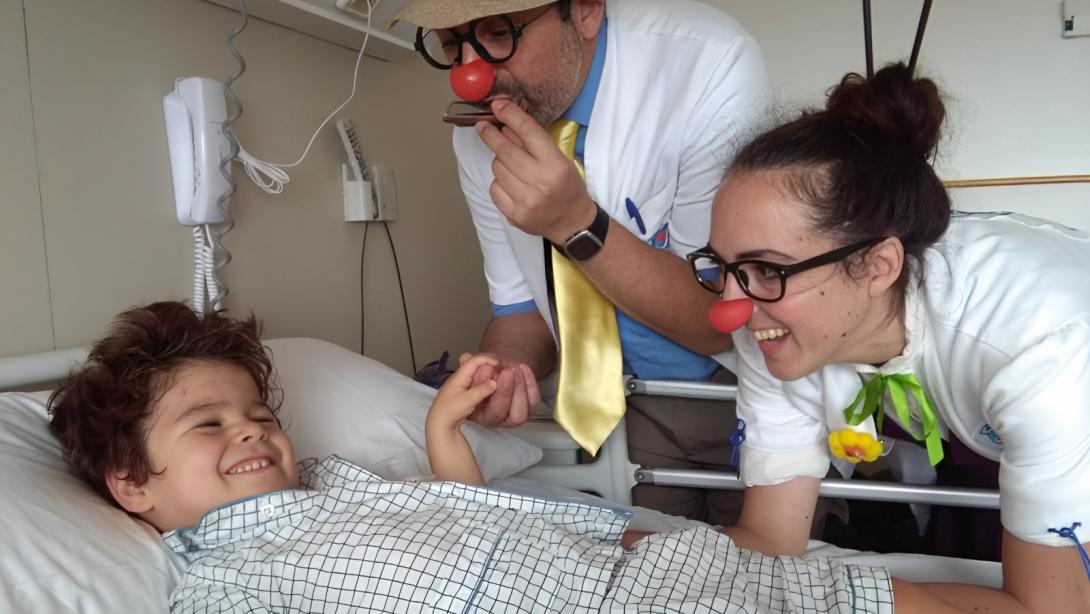"We would have been grateful if there had been a network to share all the information available on rare diseases"

The mother of a patient shares her experience in getting a diagnosis and underscores the need to promote better coordination between centers that treat rare diseases
Alonso was just a few hours old when his parents suspected that he was suffering from a serious illness. "He began to have seizures", explains Covadonga, his mother, "and two days later he had to be admitted to the ICU. He was there for a month and a half". It wasn't until over five years later, however, that doctors were able to name the disease that had caused these seizures and that would lead, as he grew older, to other health issues such as delayed motor skills, digestive problems, visual impairment, etc.
The family was on a veritable five-year quest to find a diagnosis and treatment for their son. Alonso's parents decided to move to another area in search of specialists who could treat their child. "I've lost count of the specialists we've seen. We even wrote to a program for undiagnosed people in the United States to ask if Alonso could participate", the mother remembers.
They had already moved from Salamanca to Oviedo when the child was first sent to a hospital in Madrid and, later, to Barcelona, to the SJD Barcelona Children's Hospital, where a team from the Neurology Department under the leadership of Dr. Carme Fons was finally able to reach a diagnosis: Alonso had a rare disease called KCNQ2 epileptic encephalopathy.
“Over all those years of waiting, I had often imagined what the moment of diagnosis would be like: what I would do when the doctor told me what Alonso had, if I would hug him... But when Dr. Fons called me to tell me that they now knew what disease my son had, the first thing I asked her was: Is it degenerative? Does treatment exist? Because at that point we had gotten used to living day by day, but then I felt the need to know how he was going to evolve, to know if he was going to die. Fortunately, the doctor told us that it wasn't degenerative and that it could get better with the right therapy”.
Like many children affected by rare diseases, Alonso's condition has no cure. The attending professionals can only offer him treatments to help with his symptoms. In his case, an anti-epileptic drug that doctors started him on when he developed status epilepticus at the age of one resulted in another hospital admission, seriously endangering his life. “Even though the doctors still didn't know what was wrong with him, they gave him a treatment to prevent epileptic seizures, which, fortunately, proved so effective that he still takes it”, says his mother.
Single network for coordinating hospitals that treat rare diseases
Covadonga is convinced that creating a network that connects all hospitals that treat children with rare diseases, such as the one currently being promoted by the SJD Barcelona Children's Hospital and FEDER to improve care for these patients, would be a major step in the right direction. "I would have been incredibly grateful to have a network like this that allows professionals who work across Spain to share all the available information on rare diseases. I would have been incredibly grateful to have someone to guide me and provide me with all the information available on my son's disease. It would have meant many less sleepless nights searching for information about Alonso's symptoms, trying to find out how many other children were in the same situation, trying to find treatments that could be useful for him and experts who could treat him", she explains.
The Únicas Network, jointly created by SJD Barcelona Children's Hospital and FEDER, is a single network designed to ensure equal treatment of children with rare diseases regardless of where they live in Spain, preventing a significant amount of the trips that the families of children with rare diseases have to make outside their autonomous community to be seen by experts in their condition.
Covadonga has lost count of the trips she's made to Madrid and Barcelona in the decade since Alonso was born. "If the doctors who treat these children could have access to the leading experts in rare diseases, to know what tests should be run for each case... I'm certain that we would save a lot of trips, that these children would only have to make the strictly necessary ones, to do the tests or studies that can't be done in their own community. And that would be major. And I say this not only because of the financial cost of these trips, which is significant, but also because of the difficulties they entail for a sick child. Fortunately, we have the resources to do it, but there are many families who don't", concludes Covadonga.






